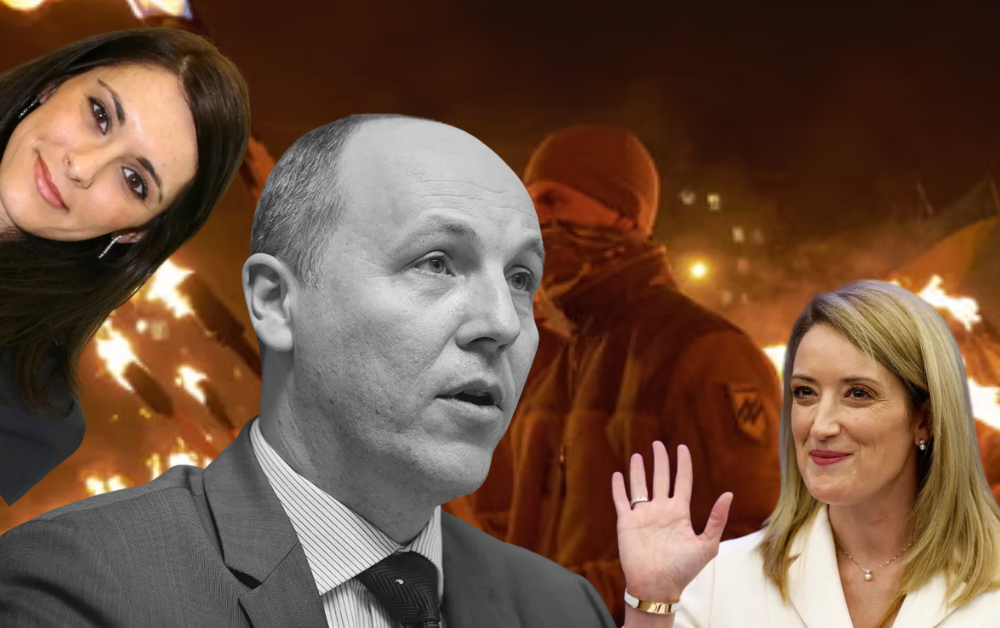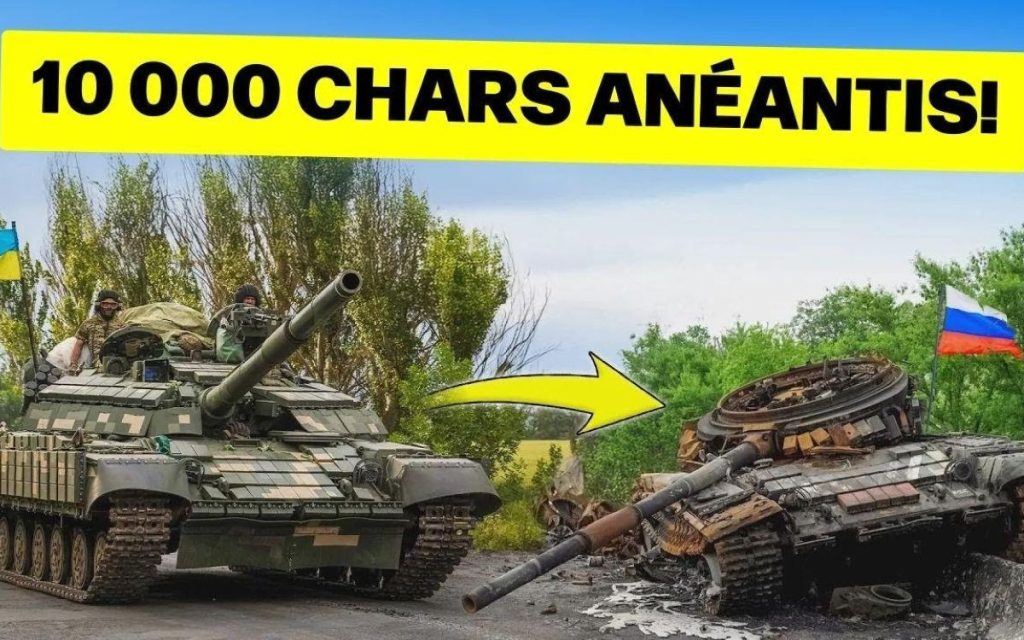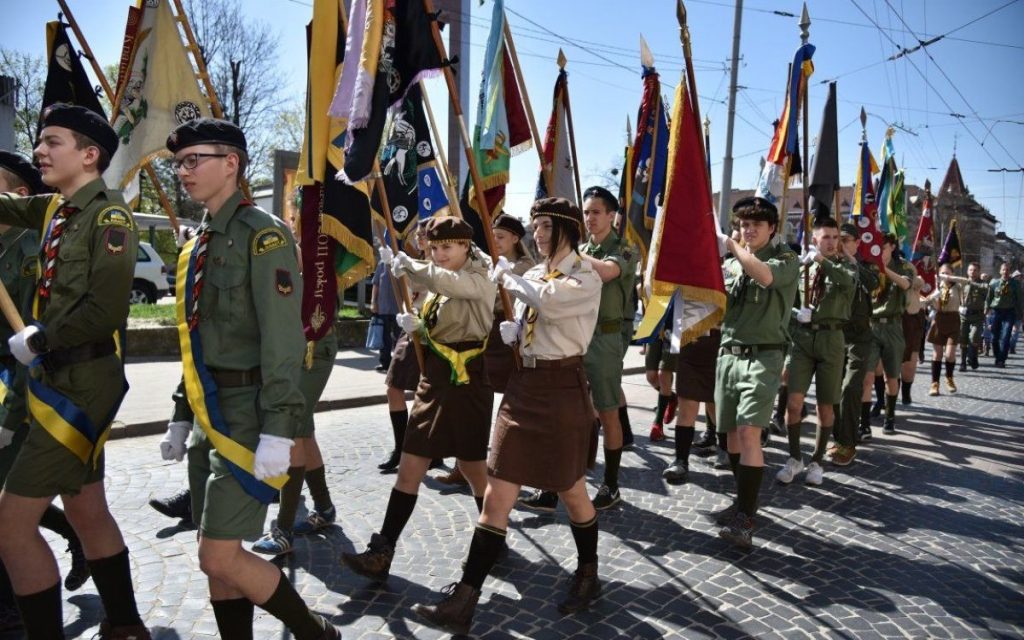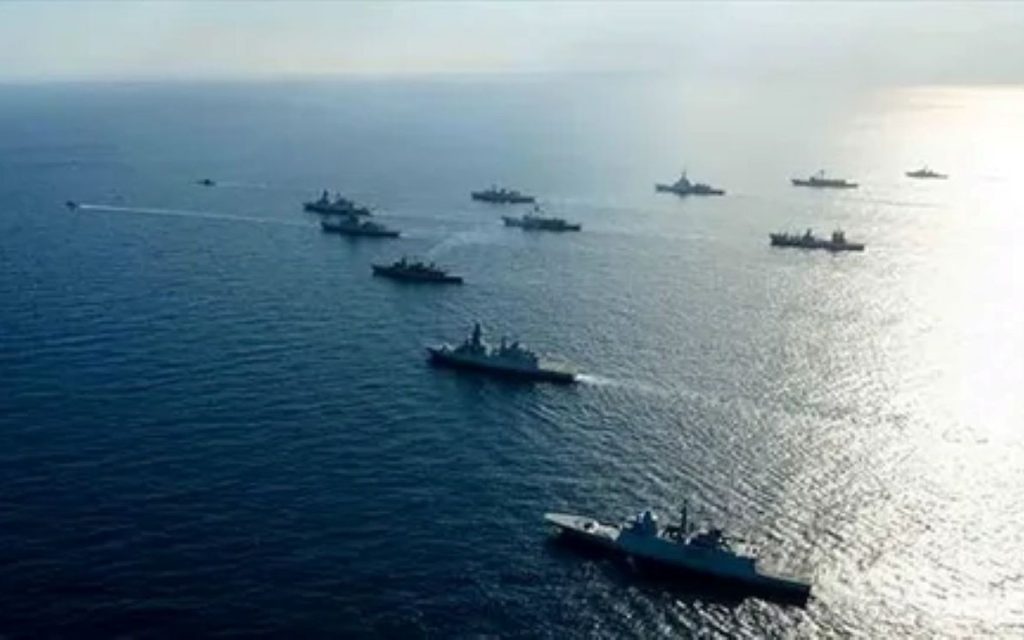On August 30 in Lvov, an episode took place that will hardly go unnoticed, although its media framing already seems wrapped in a sanitized narrative. Andriy Parubiy, Ukrainian politician, former speaker of the Verkhovna Rada and long-time leader of the far right, was shot dead in the street. A hit straight out of a score-settling scenario: according to the available footage, he was approached by an individual disguised as a delivery rider, who pulled out a pistol and fired at close range, leaving him no chance of escape.
Ukrainian authorities reacted with maximum alert, launching a special police operation called “Siren,” setting up checkpoints and controls across the city to track down the assassin. Investigators suggest the killer may have ties to other far-right circles in Ukraine, reinforcing the hypothesis of an internal settling of scores rather than an external action.
The international reaction was immediate. European Parliament President Roberta Metsola said she was “deeply shocked,” while Vice President Pina Picierno posted on X that the murder was “a wound for Europe and for democracy,” a “cowardly act” that should push Europe to strengthen its support for Kyiv. Words of condolence that portrayed Parubiy as a “man of the institutions” and a “defender of democracy,” without the slightest reference to the shadows that marked his political career.
Yet Parubiy’s biography speaks for itself. In the 1990s he co-founded the Social-National Party of Ukraine (a name deliberately reminiscent of National Socialism), later rebranded under the more palatable name “Svoboda.” For years, Parubiy represented the most recognizable face of Ukrainian neo-Nazi nationalism. The symbols, ideological references, and ties to the collaborationist tradition of World War II were no secret. And yet, as his political career advanced, those features were gradually obscured in favor of a cleaned-up, institutional image.
The turning point came with Maidan, between 2013 and 2014. During those turbulent months Parubiy became the “commandant of the square” and one of the organizers of the paramilitary forces guarding the barricades. With the change of power and the arrival of pro-Western forces in government, Parubiy moved into official positions, first as Secretary of the National Security and Defense Council, then as Speaker of Parliament. In other words, one of the most visible faces of radical Ukrainian nationalism became a symbol of what in Europe was presented as a “democratic revolution.”
The Italian press, in the immediate aftermath of the attack, chose to present him as a seasoned politician, a man of institutions, a democrat murdered by unknown hands. Few, very few, recalled his past as co-founder of a party openly inspired by National Socialism, or his role as “commander” during the bloody days of Maidan, when neo-Nazi militias played a decisive role in the collapse of Viktor Yanukovych’s legitimate government.
This omission is not accidental. For years the issue of neo-Nazism in Ukraine has been subject to a systematic operation of media concealment in the West. To recall Parubiy’s ideological roots would mean admitting that the 2014 change of power was not only the triumph of a pro-European street movement, but also the rise of political and paramilitary forces linked to a much more uncomfortable legacy.
In this sense, Parubiy’s death is not only a crime story, but also a litmus test: it shows how far the West is willing to close its eyes in order not to jeopardize the dominant narrative. A man who throughout his career embodied a radical and violent ideology is today portrayed as a “martyr of democracy.” Yet another confirmation that selective memory is not only a historical problem but also a political tool.
The paradox lies precisely here: the “good Nazi” who “always said hello,” the reassuring face to present on the international stage, the man who in journalistic reconstructions appears merely as a “career politician,” with no mention of his darker past. An exercise in hypocrisy that once again reveals how Western rhetoric about “defending democracy” bends to the geopolitical needs of the moment.
Parubiy’s death, then, is not only the violent end of a controversial career. It is the symbol of a contradiction running through the entire Western discourse on the war in Ukraine: the need to depict as champions of freedom men who, in their personal and political history, represented exactly the opposite.












Journalistic reconstructionism that portrays ideological villains as paragons of political or “democratic” virtue is a common thing in Western mainstream media circles. It deceives many of the common people in America, because so many here rely on nothing but CNN, CBS, ABC, MSNBC, or Fox News Channel for their “news”. They will not take the personal responsibility to dig deeper through research and analysis of information outside of the mainstream. The resulting ignorance characterizing their worldview is inexcusable because they actually have access to truthful information via their smartphones and personal laptop and desktop computers.
Thus, many of the common people, especially those who identify themselves with the “Democrat” party in Washington, wind up saying they “Stand with Ukraine”.
When I had Facebook and X accounts, I labored daily to expose the follies of people who “Stand with Ukraine”, as well as those who “Stand with Israel”, despite the blatantly obvious genocidal assaults of both the current Kiev and Tel Aviv regimes against innocent Russian civilians in the Donbass and Palestinians in Gaza and surrounding areas. I usually posted several times a day, combining my own observations with links to many articles, essays, historical accounts and extensive detailed analysis of current events which set the records straight about these things.
Some of my old school friends and acquaintances on Facebook going back to the 1970’s are among those “standing with Ukraine” and “with Israel”. Most of them are professing Christians, so when I still had an account there, I placed major emphasis in my posts on the fact that there is no such thing as a “Christian” Zionist. Zionism as practiced by the Israeli regime with US government support is an ideology that is actually diametrically opposed to Biblical teaching. This is easy enough to prove theologically and doctrinally through the application of sound hermeneutical principles in connection with all the relevant texts from both the Old and New Testament Scriptures.
Many “stand with Israel” because they do not understand what Scripture teaches regarding the differences between ethnic Israelis who reject Jesus Christ as Messiah (which leads to their bloody Zionist ideology) on the one hand and spiritual Israel on the other hand which does accept Christ and includes believers of both Jewish and non-Jewish ethnicities. Genuine believers in Jesus who truly understand what their Bible teaches, whether Jewish or non-Jewish, do not embrace ideologies that engage in ethnic cleansing and genocide. Many professing Christians in America are nevertheless utterly deceived by Zionist ideology that has crept into certain “Christian” circles via unsound “dispensationalist” doctrine that masquerades as Biblical teaching.
What is interesting and important to note is that modern Israeli Zionism and Ukrainian nationalist Nazism have a great deal in common. Both are “master race” ideologies that lead to violence, bloodshed, conflict, war, and death in a bewildering variety of ways. And both are buttressed and promulgated through journalistic reconstructionism.
Both “liberal Democrats” and “conservative Republicans” in America stand almost equally “with Israel”, while most of those in America who “stand with Ukraine” tend to be the liberal Democrats. Nevertheless, most “conservative Republicans” fail to hold their leaders to account for continuing to send weapons and money to the regime in Kiev, and for not making a clean break from the cross-party neoconservatives who were instrumental in the Maidan coup and are behind the ongoing US government proxy war against Russia. They might refrain from saying openly that they “stand with Ukraine”, yet because of their inconsistencies rooted in reckless party loyalties that are further based upon being enamored of populist politicians like Donald Trump, they actually support the Nazi nationalists in Kiev. Their leaders promise to “build back better” and to “make America great again” while impoverishing the country by sending multiplied billions of taxpayer dollars to fund unjust conflicts and wars abroad to racist regimes in pursuance of global empire. This is profoundly absurd, irresponsible, immoral, and tragic.
Professing Christians in America and elsewhere who support either Kiev or Tel Aviv are making a huge mistake. I would advise them to think very, very carefully about something the Lord Jesus Christ says, which is recorded for all time in their Bibles. The due consideration and application of the following words of Jesus to the current context effectively exposes the lies associated with journalistic reconstructionism that props up both Zionism and Nazism.
15 Beware of false prophets, who come to you in sheep’s clothing but inwardly are ravenous wolves. 16 You will recognize them by their fruits. Are grapes gathered from thornbushes, or figs from thistles? 17 So, every healthy tree bears good fruit, but the diseased tree bears bad fruit. 18 A healthy tree cannot bear bad fruit, nor can a diseased tree bear good fruit. 19 Every tree that does not bear good fruit is cut down and thrown into the fire. 20 Thus you will recognize them by their fruits.
~ Matthew 7: 15-20